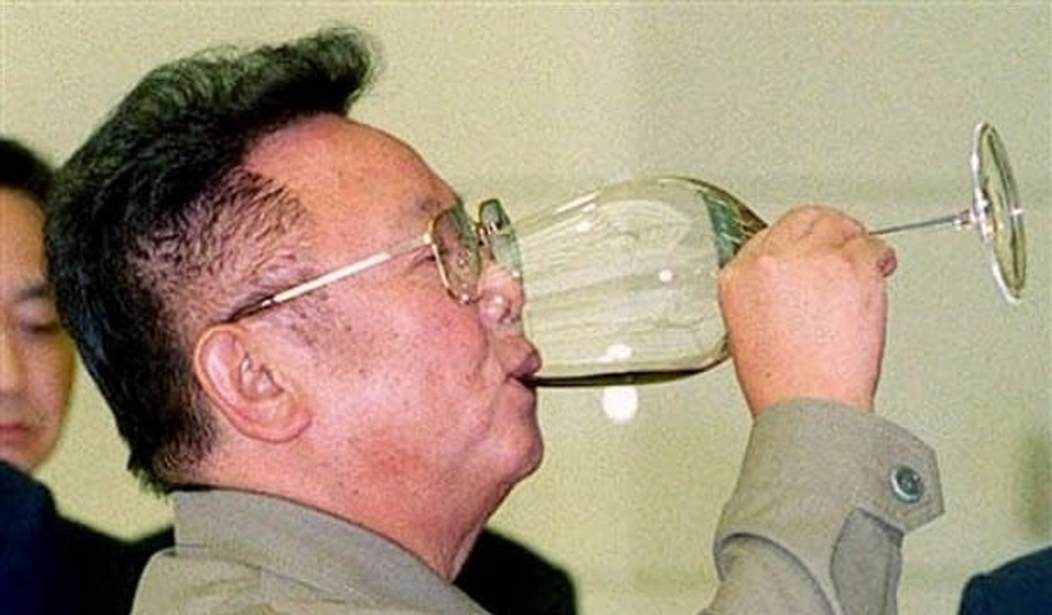North Korea’s Dear Leader Kim Jong-il is dead at the age of sixty-nine. The spin by the North Korean media is that he died of a heart attack caused by overwork: “He worked day and night for socialist construction and happiness of people, for the union of country and modernisations. He left us so suddenly.”
Here is a video from the North Korean media of assembled denizens of Pyongyang, some in tight military-like formations, lamenting his death. Residence in that city, the capital, is carefully limited to those deemed faithful to the regime. Luxuries unavailable elsewhere are provided there.
[youtube=http://www.youtube.com/watch?v=pSWN6Qj98Iw&w=640&h=360]
An e-mail alert sent by STRATFOR on December 19 states that Kim died on
the morning of Dec. 17, according to an official North Korean News broadcast at noon Dec. 19. Initial reports say Kim died of a heart attack brought on by fatigue while on board a train. Kim is believed to have suffered a stroke in 2008, and his health has been in question since.
He may have died shortly before the 17; official reports from the North are not usually very candid. In any event, the apparent two-day delay in the official death announcement — from the morning of December 17 until noon on December 19 — may be significant. If for nothing else, time was needed to ensure stability. Now, the country has essentially shut down:
Following the official announcement of Kim Jong Il’s death today, North Korea has imposed rigid social controls, including the complete closure of markets.
An inside source told Daily NK this lunchtime, “The jangmadang is closed and people are not allowed to go outside. Local Party secretaries are issuing special commands through local Union of Democratic Women unit chairwomen, and the chairwomen have been gathered at district offices for emergency meetings.”
According to the source, National Security Agency and People’s Safety Ministry agents have been deployed in streets and alleyways to control civilian movements. There have not been any signs of public unrest to date.
Kim Jong Il’s sudden death has apparently caught people off-guard, the source revealed, commenting, “Nobody had the slightest idea about the General’s death even right before they saw the broadcast. You can hear the sound of wailing outside.”
North Korea has also “urged an increase in its ‘military capability’ as the death of North Korea’s enigmatic leader Kim Jong Il spurred fresh security concerns in the tense region.” On the same days as Kim’s death was announced, North Korea test-fired two short-range missiles off its eastern coast. There has been little additional information from the provinces as to what else may be happening there in response to Kim’s death.
In South Korea,
President Lee Myung-bak canceled the rest of his Monday schedule and put all members of South Korea’s military on “emergency alert,” his office said. The two nations never signed a peace treaty following the Korean War of the early 1950s, leaving the two nations technically at war.
After an emergency Cabinet meeting Monday, Lee asked South Koreans “to go about their lives.”
“For the sake of the future of the Republic of Korea, peace and stability on the Korean Peninsula is more important than anything else. It should not be threatened by what has happened,” he said.
The death of Kim Jong-il will significantly disrupt the recent United States-North Korean negotiations over food aid and the termination of its nuclear activities. It was reported on December 17 that between December 15 and 17 (Kim’s death on the morning of December 17th was probably not then known by the negotiators to have occurred), the U.S. and North Korea had resumed talks about food aid and there appeared to be an agreement to send 240,000 tons of food supplies in twelve monthly shipments of 20,000 tons each. The sides, the sources said, “reached the agreement based on North Korea’s pledge to implement initial measures of denuclearization that include a suspension of its uranium enrichment program.”
On December 18 — the day after Kim’s death but the day before the official announcement — it was reported that “an agreement by North Korea to suspend its controversial uranium enrichment program will likely follow within days.” However, upon learning of Kim’s death,
the Obama administration says it remains committed to stability on the Korean peninsula and is closely monitoring developments there following the death of North Korean dictator Kim Jong Il and the apparent transfer of power to his son.
The administration had been expected to decide, possibly as early as Monday, whether to try to re-engage the reclusive country in nuclear negotiations and provide it with food aid, U.S. officials said Sunday. The officials, who spoke on condition of anonymity due to the sensitivity of the situation, said Kim’s death would likely delay the effort.
The officials said the U.S. was concerned about any changes Kim’s death might spark in the military postures of North and South Korea, but were hopeful calm would prevail.
As a minimum, it will be necessary for the United States to gather and analyze information from credible sources on who is in charge in the North and to see what may happen there next.
Kim’s death had long been anticipated, with glee but also with trepidation. His quite young son, Kim Jong-un (variously reported as between twenty-eight and thirty), is his apparent successor and the path had been well laid for his succession; the “Brilliant Young General,” who has no military experience, is now referred to in the North Korean media as the “Great Successor.” However, it cannot yet be divined whether he will be accepted by the military or shunted aside so that a regent can assume control. In view of substantial propaganda efforts made during the past year or so to elevate his stature and popularity in the North, his continued but perhaps temporary presence in an at least a ceremonial role seems likely.
The leadership of China, said to be the only country with good access, is likely to be better able than any other to find adequate clues for predicting and perhaps for affecting the future. China may, or may not, share some of its information with the United States and others. If it does, there is no clear reason to anticipate that it will be completely forthcoming; to do so probably would not be in China’s own best interests.
In November, I wrote an article at PJ Media titled “Will North Korea Collapse?” It was based largely on a study done by an official Russian think tank that concluded that the collapse of the North would be triggered by the death of Kim Jong-il and that the entire peninsula would eventually come under the dominion of the South. The think tank viewed that as a positive development for Russia. The Dong A-Ilbo, a South Korean newspaper, saw substantial significance in the think tank’s analysis and commented back in November:
Russia has shunned using the term “collapse” for the North, so it is unusual for the think tank, which helps devise Moscow’s foreign policy, to consider the collapse of the North as a fait accompli. This signals that either the North is showing abnormal signs that cannot be taken lightly or Russia is making a major change in its assessment of the North’s status. Moscow has apparently judged that the North is on a downward path toward collapse and that the path is rapidly narrowing.
As also noted in my November article, Russia and North Korea’s principal ally, China, have different interests. China does not desire reunification of the peninsula under South Korean control. Rather, according to Chinese President Hu about a year ago,
“independent and peaceful reunification” of the two Koreas is “in the fundamental interest” of both sides.
Asked whether China believes “that reunification of the Korean peninsula will bring more stability than maintaining the status quo?” Hu said, “As a close neighbor and friend of [both Koreas], China hopes that the North and the South will improve relations and achieve reconciliation and cooperation through dialogue and consultation and eventually realize independent and peaceful reunification, and we support their efforts in this regard. This is in the fundamental interests of both the North and the South and conducive to peace and stability on the peninsula.”
The Chinese leadership has expressed support for reunification independent of the military and political influence of the U.S. and led by the two Koreas themselves several times. But it has been widely believed to prefer the status quo for strategic reasons. (Emphasis added)
The transition from Kim Jong-il, critical to the future of the two Koreas, had already begun by last November.
Kim Jong-un, thought to be in his late 20s, emerged from obscurity a year ago this past week as a four-star general and vice chairman of the Central Military Commission of the Workers’ Party. . . .
He has also been seen on state-run television with
“octogenarian party secretaries bowing to a man their grandchildren’s age before accepting the smiling man’s handshake or kowtowing to his instructions.”
A year after Kim Jong-un made his public debut as North Korea’s leader-in-waiting, scenes like that — the old party elite groveling — have become a staple of North Korea’s propagandist media, a crucial tool for the country’s leader, Kim Jong-il, to elevate his son as his successor.
Now that the transition, probably to Kim Jong-un but possibly temporarily and/or only as a figurehead, is substantially further underway than back in November, it may in the long term generate tensions between Russia and China. Further speculation about the short and long term consequences without additional information from the North seems pointless. If the very recent news develops over the next few days updates will be provided.
(Also read Dan Miller’s PJ Media article from November titled “Will North Korea Collapse?“)









Join the conversation as a VIP Member